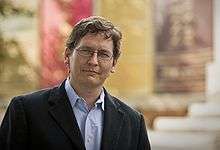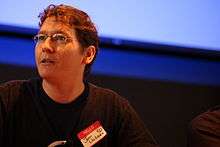John Wilbanks
John Wilbanks is the chief commons officer at Sage Bionetworks and a senior fellow at the Ewing Marion Kauffman Foundation and at FasterCures. He runs the Consent to Research Project.[1]
John Wilbanks | |
|---|---|
 Wilbanks in Kansas City in 2009 | |
| Alma mater | |
| Occupation | Senior Fellow |
| Organization | Ewing Marion Kauffman Foundation |
Education and career
Wilbanks grew up in Knoxville, Tennessee, US. He attended Tulane University and received a Bachelor of Arts in philosophy in 1994.[2][3] He also studied modern letters at the Sorbonne in Paris.[2]

From 1994 to 1997, he worked in Washington, DC as a legislative aide to Congressman Fortney "Pete" Stark. During this time Wilbanks was also a grassroots coordinator and fundraiser for the American Physical Therapy Association.[3] Wilbanks was the Berkman Center for Internet & Society's first assistant director from the fall of 1998 to the summer of 2000. There he led efforts in software development and Internet-mediated learning, and was involved in the Berkman Center's work on ICANN.[3]
While at the Berkman Center, Wilbanks founded Incellico, Inc., a bioinformatics company that built semantic graph networks for use in pharmaceutical research and development. He served as President and CEO, and led to the company's acquisition in the summer of 2003.[3][4] He has also served as a Fellow at the World Wide Web Consortium on Semantic Web for Life Sciences, was a Visiting Scientist in the Project on Mathematics and Computation at MIT,[5] and was a member of the National Advisory Committee for PubMed Central.[3] He is a member of the Board of Directors for Sage Bionetworks[6] and on the advisory boards of Genomera, Genomic Arts, and Boundless Learning. He is an original author of the Panton Principles for sharing data.
Wilbanks led a We the People petition supporting the free access of taxpayer-funded research data, which gained over 65,000 signatures.[7] In February 2013, the White House responded, detailing a plan to freely publicize taxpayer-funded research data.[8]
Consent To Research
Consent to Research (CtR) is a project that provides a platform for people to donate their health data for the purposes of scientific research and the advancement of medicine. Since health data is restricted and expensive, this project provides people the opportunity to freely donate information that can only positively benefit medicine and patients at large.[9] Consent to Research is connected to the Access2Research project, which aims to free access over the Internet to scientific journal articles that are already taxpayer-funded.[10] Wilbanks founded the project in 2011 and gave a TED Global talk about the project in 2012.[11]
Science Commons
Wilbanks worked at Science Commons and Creative Commons from October 2004 to September 2011.[4] As vice president of science he ran the Science Commons project for its five-year lifetime and continued to work on science after he joined the core Creative Commons organization. He has been interviewed by Popular Science magazine,[12] KRUU Radio,[13] and BioMed Central to discuss Science Commons.[14]
Scientific American featured Wilbanks in "The Machine That Would Predict The Future" in 2011.[15] Seed magazine named Wilbanks among their Revolutionary Minds of 2008, as a "Game Changer" [16] and the Utne Reader named him in 2009 as one of "50 visionaries who are changing your world".[17] He frequently campaigns for wider adoption of open access publishing in science[18][19] and the increased sharing of data by scientists.[20][21]
Footnotes
- "Glossary of Terms". Consent to Research online. Archived from the original on 2011-11-14.
- "Wilbanks Bio" (PDF). Max Planck Institute for Gravitational Physics, Potsdam. Retrieved 2008-06-21.
- "John Wilbanks". Berkman Center for Internet and Society. 2008-01-09. Retrieved 2008-06-18.
- "People - Creative Commons". Creative Commons. Retrieved 2008-06-18.
- Project on Mathematics and Computation
- "Sage Bionetworks Seattle | Directors". Archived from the original on 2012-02-11.
- "John Wilbanks TED Profile". Retrieved 12 Mar 2013.
- Mike Masnick (Feb 2013). "White House Orders Federal Agencies To Require More Open Access To Not Just Research, But Data". Retrieved 27 Mar 2013. - Direct link to response is in this article. Blacklisted by WP's spam filter.
- "Consent to Research - About Us". Consent to Research. Archived from the original on 2012-06-29. Retrieved 2012-07-06.
- "Access2Research - About Us". Access2Research. Archived from the original on 2012-05-24. Retrieved 2013-02-06.
- "TED Blog - Unreasonable people unite: John Wilbanks at TED Global 2012". TED. Retrieved 2012-07-06.
- Seiff, Abby (2007-07-19). "Will John Wilbanks Launch the Next Scientific Revolution?". Popular Science. Retrieved 2008-06-18.
- Raman, Sundar (2007-01-23). "16 - Open Views - John Wilbanks, Science Commons". Retrieved 2008-08-08.
- Weitzman, Jonathan B. (2004-12-20). "Science Commons makes sharing easier". Open Access Now. Archived from the original on 2005-01-31. Retrieved 2008-06-18.
- "The Machine That Would Predict The Future". Scientific American. Retrieved 2011-11-18.
- "John Wilbanks - Science Commons". Seed Media Group. Retrieved 2009-01-06.
- "John Wilbanks - Executive Director, Science Commons". Utne Reader. Retrieved 2009-10-16.
- Wilbanks, J. (2006). "Another reason for opening access to research". BMJ. 333 (7582): 1306–1308. doi:10.1136/sbmj.39063.730660.F7. PMC 1761190. PMID 17185718.
- Richard Poynder (2012-05-25). "Open Access: The People's Petition". Retrieved 2012-06-01.
- Field, D.; Sansone, S. -A.; Collis, A.; Booth, T.; Dukes, P.; Gregurick, S. K.; Kennedy, K.; Kolar, P.; Kolker, E.; Maxon, M.; Millard, S.; Mugabushaka, A. -M.; Perrin, N.; Remacle, J. E.; Remington, K.; Rocca-Serra, P.; Taylor, C. F.; Thorley, M.; Tiwari, B.; Wilbanks, J. (2009). "'Omics Data Sharing". Science. 326 (5950): 234–236. Bibcode:2009Sci...326..234F. doi:10.1126/science.1180598. PMC 2770171. PMID 19815759.
- Wilbanks, J. (2011). "Openness as infrastructure". Journal of Cheminformatics. 3 (1): 36. doi:10.1186/1758-2946-3-36. PMC 3197551. PMID 21999327.
External links
| Wikimedia Commons has media related to John Wilbanks. |